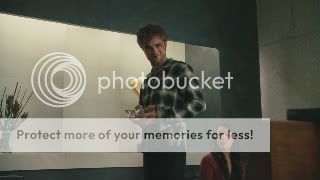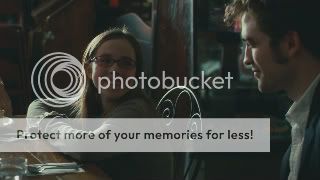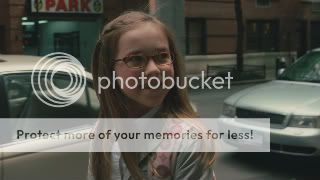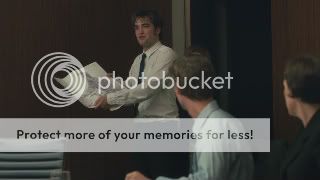Robert Pattinson brought Tyler Hawkins to life in the most touching and genuine way. He showed us his complexities, both the flawed and the admirable, all of them, and we embraced that young man as if he were one of us, one of our inner circle. The core of was Tyler’s journey, and Pattinson took us all on it, allowing us to see the heart and soul of the character Will Fetters put on the page.
Pattinson never veered from that. He gave us Tyler’s body language, Tyler’s facial expressions, Tyler’s voice. Pattinson used his being as a medium to gain access to Tyler. He was living Tyler.
Tyler’s journey has its arc [which I will cover in a future piece] but here I will jump around, the purpose being to demonstrate various aspects of Pattinson’s performance.


On the surface, this college student seems like a fairly normal young guy: he smokes, he drinks, and he’s a bit of a male-slut. He displays the self-righteousness and recklessness of his age, getting into verbal altercations with his Dad and into fist fights without much provocation.

The son of a rich man, there is evidence of a sense of entitlement about him too, when he smokes in the inner lobby of his Dad’s company office, enjoying the discomfort of the receptionist who has to put up with his behaviour because he’s the boss’s son. Pattinson hit just the right notes in this scene, with the levity and boyish charm making the defiance, if still irritating, more palatable because it is funny. His line delivery, the crack in his voice, supposedly indicating disbelief, his physical gestures and facial expressions together show an incipient comedic flair.


Oh, and Tyler does one other thing; he writes to his dead brother in a journal [see my piece,Remember MeTyler's Journal ]. He carries this around with him, constantly makes entries in it, and his voice-overs are quotes from this diary. Now we are getting to the essence of Remember Me. It is grief.
Pattinson apparently said to the Mexican magazine Reforma (and I’ll quote it as I read it): “It’s about loss, how we handle grief, how it affects us. For many people, loss becomes part of who they are, and sometimes, in order to overcome a loss, we have to leave part of ourselves behind as well.”
Suddenly, everything this character does takes on a new sheen because, under that surface, Tyler’s grief informs all his thoughts and actions. And so, when Tyler hears his brother’s name in the alley, it is a trigger, and he gets into a fight.

This screencap shows us how Pattinson subtly conveys that Tyler is now alert, not to his friends and the Miami girls, who are out of focus for him, but to his brother. It’s all on Pattinson’s face, the alert preoccupation, Tyler’s inner world coming to the surface with that mention of Michael’s name.




Later, bloodied and bruised, in jail with a pissed-off Aiden, Tyler’s attitude is so evident in Pattinson’s body language. Tyler’s response when Aiden berates him is to play with his bunched up shirt, shrug, laugh it off, and hang his head down. Pattinson plays this so well, using his lanky body to perfection as his loose-limbed movements signal Tyler’s almost fluid yielding to his predicament. Pattinson told TeenHollywood that Tyler’s Mom had wanted to sue—a deleted scene—but Tyler didn’t care, that Tyler had this blasé attitude. It’s fascinating because we see, under Tyler’s overt indifference, surrender, which is another thing entirely. There’s a lot going on in this—and every other—scene, but it illustrates Pattinson’s ability to show us many layers of his character almost through his body alone.


Let’s talk about Tyler and guilt. After Ally finds out about Tyler’s nefarious revenge scheme and leaves him, Tyler is devastated. While Aiden chomps on Chinese food and throws him worried looks, Tyler sits absorbing the shock of this new loss, and stares morosely at nothing. He gets off the couch in the most laboured way, weighted down by his misery, and shuffles down the hall, head down, fingers hooked loosely around the neck of his beer bottle, his slow plodding gait a mirror for his emotions. We know exactly how Tyler feels because Pattinson has shown us, with economy of expression and movement, and not a word has been said.


Then the guys go to the movies; American Pie 2 is showing—a 9/11 clue if anyone is interested—and the audience is laughing hysterically at the hilarious sex scene. Aiden laughs and checks for his friend’s reaction; Tyler smiles half-heartedly to appease him, then returns to his true emotional state, the dark theatre shielding it. Here, in this tiny scene, Pattinson uses his face and hand to reveal Tyler’s feeling of guilt, and his nausea was palpable. The sadness just wafts off him, his eyes show us his pain. Again, no dialogue, but everything said through his subtle facial expressions and minimal movements.
Tyler relates to every other character differently and this gives us a chance to see different aspects of him. He is a truly multi-dimensional person.


With his sister Caroline, Tyler is playful, supportive, but most of all, the protective older brother. In the sweets shop, where we first see the Hawkins’ family dynamic, he gazes at her with undiluted and uncomplicated love and she basks. He is playful with her, shares jokes, treats her with respect.

She confides in him, especially about her concerns about whether or not their Dad loves her.


He picks her up from school and when he realizes she is worried her classmates think she’s a freak, he puts on a French accent, and entertains her with garbled French gibberish, ‘sacre bleu’.

When she invites him to her art show he responds, “abso-freakin-lutely!” which makes her laugh. Pattinson brings a natural ease to these scenes. He and Ruby Jerins make this special relationship seem so real, so vibrant and pure, it is a pleasure watching these actors exchange dialogue.

Even the smallest scene makes us believe we are seeing, for example, a big brother on the bed with his little sister, his arm around her while she cuddles up to him, hurt from a bullying incident. He reads to her, his voice gentle and life-affirming. Not Jerins and Pattinson—and not a hint of Edward or Jimmy Dean—no, it is Caroline and Tyler.
Pattinson has said—DVD extra—that “Tyler is not really living at the beginning....but by the end he accepts whatever will be.” He has also said Ally “shows him how to live and how to mature...” Before Ally, there was ‘toothbrush’ girl and others. But, to revise, Tyler is not a man-slut but too lost and tortured to have a real relationship. Ally is the key to Tyler’s change, but there is no grand epiphany, no moment when everyone knows Tyler has changed. It is gradual, more realistic, and there is backtracking and conflict along the way. Ally is, arguably, the strongest character in Remember Me and Emilie de Ravin has also done an excellent job.


Ally’s ability to change Tyler begins, I think, when she throws him off. She doesn’t jump at a chance to go out with him, but tests his responses to her questions and doesn’t extend her hand until she gets a bit of truth. Tyler, who could have any girl he wanted on the basis of his looks alone, has to work for it. And it’s fun watching Pattinson’s face as his character tries tacks to hook her. You can smile through the repartée of this whole exchange.

Then, on their first date, which she almost forgets, she really throws him with her talk of dessert first. Boy does she have his attention. Again, beautiful acting off each other. Pattinson’s facial expressions here are priceless, as he tries to figure out Ally’s peculiarity, to reconcile it with the intelligent woman he knows she is. He looks at her askance.





He asks if it is a political statement or a medical condition—great line—then listens, all ears, as she explains. He’s too confused to laugh, so smiles, his mouth doing a great acting job all on its own. He clears his throat, opens his mouth as if to laugh, then just closes it. Pattinson’s eyebrows quirk, but it’s his mouth that wins the award here. It’s priceless how he shows us Tyler’s puzzlement. Then, later, she won’t even let him kiss her good night! What a woman!
There’s a lot to say, about this and all of Tyler’s other relationships and how Pattinson handles them. But I know, even with the pretty pictures used for illustration, generally short attention spans prevent me from covering much more. Suffice to say that Pattinson shows, as with the moments I’ve already mentioned, the other aspects of Tyler so well. The mischievousness when he sprays Ally, the vulnerabilities, the hurts, the guilt, the violence, and so much more. I am only touching the surface.
But I will cover the boardroom scene. While Pattinson has garnered good reviews for his acting in this film (Kevin McCarthy, Jackie Cooper, Dustin Putman, Pete Hammond, Kirk Honeycutt, Mary Ann Johanson and others), some critics disparaged Pattinson’s acting in the boardroom scene thus:
“He’s all elbow, stuttering and petulance...the big fight...is painfully bad..” [David Medsker] and “...confrontation scene in which Pattinson goes so overboard with his acting...” [Edward Douglas]. A dissenter is Rob Stammitti, who says that the ‘fiery moments’ between Pattinson and Brosnan ‘show off some of his potential’. Okkkay.
I think Pattinson’s performance in the boardroom scene is very good, but no better than in so many other scenes. But blow-up scenes are flamboyant chances for the actors to let loose and people seem to think this tests an actor’s chops more. I disagree, because subtleties are much more difficult to pull off.
I mentioned—part one—that I perceive this scene differently than Pattinson does. In video interviews he has said that Tyler is bringing old ‘grudges and grievances’ to the table, that ‘they’re just old’ and that Tyler and his Dad ‘have had the same fights before’, that after them, Tyler doesn’t even remember what he’d been arguing about and ‘feels impotent because it didn’t mean anything at all’. He says that the reason Tyler fights is that he’s trying to ‘break his Dad’s confidence’, that he won’t ever ‘shatter’ Charles, ‘which is the only reason he’s fighting him'. And that he doesn’t fight his mother because ‘she’s already completely broken’.
Pattinson told TeenHollywood Tyler is ‘rebelling against nothing’. But Tyler does have a cause. He must break down the wall Charles built to keep his family out (probably after Michael died). For me, ‘shatter his confidence’ only makes sense if it means getting Charles to engage his family. This is of utmost importance and it is one of the things Tyler must do, because only he can do it.
There is so much going on in this scene—which I’ll analyze in my piece on Tyler—but the bottom line is that Tyler is determined to call his father out for ignoring his children, to provoke him if necessary, anything to get through to him, because their lives are on the line. Yes, it is histrionic, yes, ‘hysterical gibberish’ (Pattinson), but it is to a purpose. Charles must re-engage and Tyler must break down the wall because Charles is terrified to do so. It is pivotal.


A fellow commenter [‘Rum’, quote #48] pointed out that when Tyler gets to Charles’ office, sweat-stained from the angry ride over on his bike, he deflates and becomes a pleading child. Yes, Pattinson shows us this vulnerable, scared kid who wants his Dad to show them he loves them. “She drew you a picture...” . All of Pattinson’s body language, the hand on hip self-righteousness, the guilt-inducing lines—‘why aren’t you riveted’—reveal a man-child using any weapon at his disposal to get his Dad to wake up.

His face becomes ugly as it contorts in anguish. Yes, Tyler is absolutely anguished.


He continues by saying that Charles can’t just ‘shatter’ their world.


After Charles dismisses him as irresponsible, as a child—‘You pedalled down here on your bike’, ‘You’re responsible for no one’—Pattinson’s face mutates frame by frame from disbelief, to impotence, to pleading, to anger and cynicism. Pattinson shows this so well. Next comes Charles trump line—‘You think, whatever you feel in your heart, I don’t also feel it in mine?’—which, with his employees present, is pure grandstanding.

Tyler feels defeated; he is near tears here.

Then he counters with what the audience doesn’t know—‘You didn’t find him’—a line which Pattinson delivers with just the right mix of pleading, accusation and misery. The fact that an adolescent Tyler found his brother’s hung body is a class-A trauma, one that should be handled carefully. Charles only hardens at that point when he should be comforting. But, wait, he’s got a room full of witnesses that he insisted remain there.
Let’s address the ‘stuttering and petulance’. Er, yes, the stuttering was the gibberish. In reality huge rage produces stammering if it stays verbal, and actually, most such confrontation scenes in movies are unrealistic because they don’t show this. I don’t know whether Medsker criticized Pattinson or Tyler for the petulance, but this confrontation was necessary and Tyler used any means necessary to join battle. Because he had to. Anyone who doesn’t understand that, doesn’t understand Tyler or his purpose.
Enough.
It was said that “Hollywood...is watching to see if Robert Pattinson can pull in a wider audience sprinkled with all ages and sexes” [Hollywood is Watching: Can Robert Pattinson Open a Film?]. Actually, those are two different questions. It turns out, the teens who love Edward, don’t like to see him with a different love interest, so they pretty much boycotted the film. On the other hand, those people who did go reported on the diverse audience demographic, and on the fact that non-Twilight fans received it very well.
Note:
-‘my date... was blown away. He loved it. He was so moved he couldn’t stop talking about it the rest of the night without choking up.’ [CAEdge. Brevet]
-‘I got dragged to this movie by my wife...It’s how this film touches my heart that sets it apart.’ [Steven. Brevet]
-‘We—on a French RM forum—all respond to RM on different levels according to our age—we’re 13-52—and our experience, but everyone agrees: the film is simply breathtaking. [Kim. Brevet]
-‘Took her 16 yr. old son, who said to her: “Mom, seriously, that was the best movie I have ever seen...Mom, this movie changed me.” [Kelly. Brevet]
I could go on but I think I’ve made my point.
Tyler is the hub of the wheel and everything revolves around him. Only a really great performance has the power to pull in a broad demographic and have the audiences utterly invested in the fate of the lead character. Pattinson has done that. Tyler gave him a broad scope of emotion and the actor conveyed it, showing his wide range.
Pattinson was living Tyler for us. He made Tyler his. And because he did it so well, we made Tyler ours. Many of us made Tyler ours forever.
source

No comments:
Post a Comment